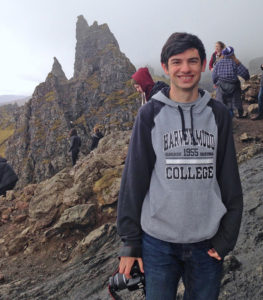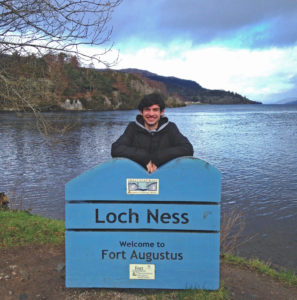“Context and Understanding Through HSA,” by Casey Gardner ’19
September 1, 2018
I’ve always seen humanities, social sciences and the arts (HSA) courses at Harvey Mudd as a way of bringing context and deeper understanding to the technical work that we do. It was never a coincidence to me that the HSA department was physically located between the two floors of the engineering department. In order to move from the theory learned in professors’ offices on the floor above to practical applications in the labs below, I had to pass through the HSA department and be reminded of the implications of my work.

Casey Gardner ’19 at the Old Man of Storr (a well-known rock formation), Isle of Skye.
During my study abroad semester in Scotland, though, my classes were on opposite ends of the campus from each other, and the context that they provided went well beyond my technical courses. Taking HSA courses abroad allowed me to more deeply examine the unique aspects of Scottish culture that surrounded me every day, adding a global perspective to my learning.
As Mudders, we seek “a clear understanding of the impact of [our] work on society,” but that only comes from a clear understanding of society itself. During my time at Harvey Mudd and abroad, I’ve taken courses on the politics of the European Union, the development of Scottish culture and the history of bagpiping. Because of these courses, I feel that I’ve gained understanding about factors that influence modern Scottish identity. Politics, literature, history—these disciplines have direct bearing on engineering and the sciences, both in Scotland and the rest of the world. Whether it’s Scotland’s diversity of natural resources, protection of unique archaeological sites or its relationship to the United Kingdom, being able to fully understand these connections and critically analyze their effects is vital.
As an engineer, recognizing the significance of regional cultures, especially when they contrast with my own, can be the difference between public support for a project or public rejection. The same is true for social scientists and physical scientists: Regardless of the subject, we need to be cognizant of the effects our work can have. The world is full of examples in which cultural treasures and natural resources are exploited or destroyed in the name of progress because their discoverers were not fully conscious of the impact of their work on society, at local and global levels. The HSA curriculum provides Harvey Mudd students with the knowledge to avoid these types of mistakes.

Gardner at Loch Ness in the Scottish Highlands, sans Nessie.
Before arriving in Scotland, I admit that I knew relatively little about modern Scottish culture. Based on the comments about bagpipes and kilts I get when I tell people where I’m studying abroad, this is true for many others as well. Looking back, if I had been assigned to manage an engineering project in Scotland, or elsewhere, I can clearly see the errors and faulty assumptions I would have made. There are still aspects of Scottish culture I have yet to fully comprehend, although I now have a much better understanding of where my knowledge gaps are, which I believe can be just as important. Through the HSA curriculum, I’ve discovered a much more extensive context that I plan to reference as I broaden my understanding. It’s a process I know will continue long after I’ve left the halls of the HSA department.